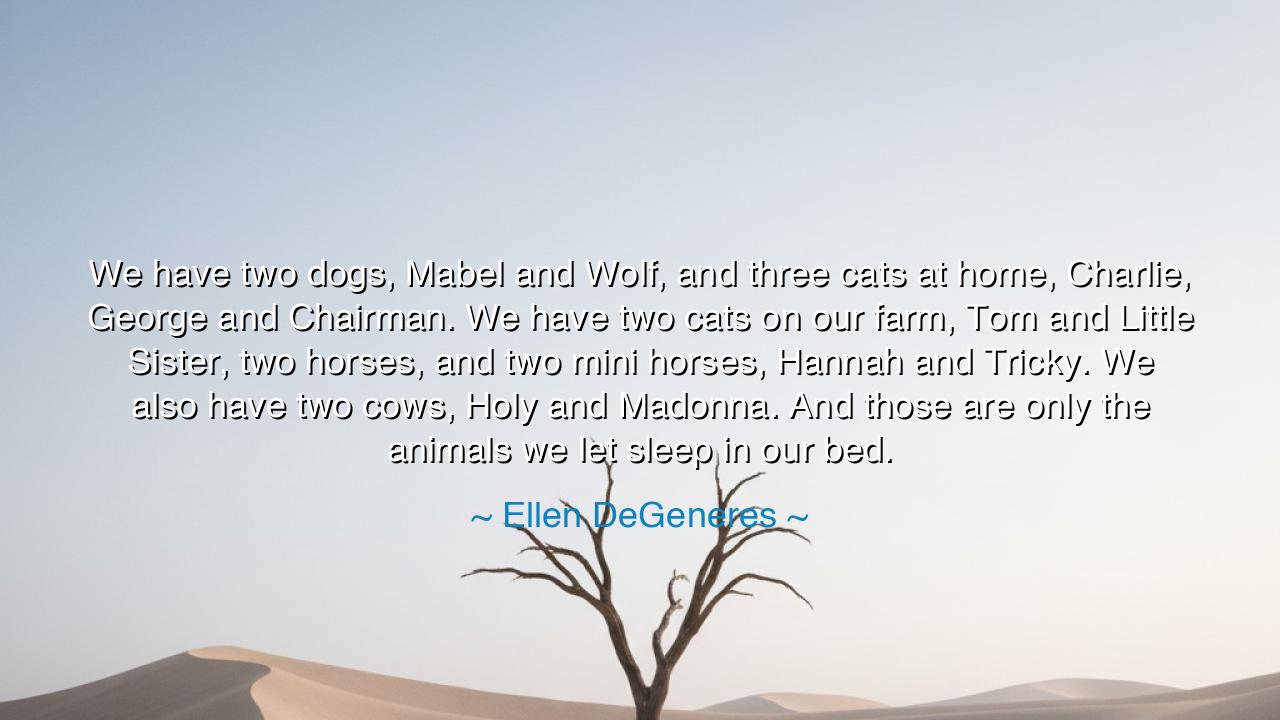
We have two dogs, Mabel and Wolf, and three cats at home
We have two dogs, Mabel and Wolf, and three cats at home, Charlie, George and Chairman. We have two cats on our farm, Tom and Little Sister, two horses, and two mini horses, Hannah and Tricky. We also have two cows, Holy and Madonna. And those are only the animals we let sleep in our bed.






In the words of Ellen DeGeneres, “We have two dogs, Mabel and Wolf, and three cats at home, Charlie, George, and Chairman. We have two cats on our farm, Tom and Little Sister, two horses, and two mini horses, Hannah and Tricky. We also have two cows, Holy and Madonna. And those are only the animals we let sleep in our bed.” — we find humor, yes, but beneath that laughter lies a profound and ancient reverence for companionship, nature, and the living bond between humankind and the creatures of the earth. For Ellen, this playful catalog of names is more than an indulgent confession of domestic chaos; it is a celebration of connection — a joyful recognition that the human heart is enlarged by every being it welcomes with love.
To speak with affection of animals is to acknowledge one’s kinship with creation itself. Long before cities and screens, humanity lived in rhythm with the beasts of field and forest. They were not merely possessions, but companions, teachers, and reflections of the divine order. The ancients saw in every creature a symbol: the loyalty of the dog, the mystery of the cat, the grace of the horse, the patience of the ox. When Ellen names her animals, she does what our ancestors did — she honors them as individuals, not as background to her life, but as fellow travelers within it. Each name is a testament of affection, a recognition of spirit. In a world that too often forgets this unity, her humor restores it.
The origin of such affection reaches deep into the roots of civilization. In Egypt, cats were sacred, believed to carry the spirit of the goddess Bastet, protector of home and family. In Rome, dogs were buried beside their masters, engraved with epitaphs declaring their courage and faithfulness. The philosopher Pythagoras taught that all souls — human and animal alike — were bound in the same cycle of existence, deserving of compassion and reverence. Ellen’s words, though spoken lightly, echo this ancient truth: that those who love animals participate in the oldest form of grace — the recognition that life in all its forms is worthy of care and tenderness.
Yet, there is also laughter in her tone, and laughter itself is sacred. In saying that these are “only the animals we let sleep in our bed,” Ellen transforms what might seem absurd into something beautiful: a world overflowing with life and affection. The humor conceals a deeper lesson — that love knows no boundary when it is genuine. Whether it is for people, for creatures, or for the earth itself, the heart that loves without measure finds joy in abundance, not in order or control. Her words remind us that to live fully is not to limit love, but to expand it — to let it fill every space, even one’s bed, if that is where comfort resides.
Consider, for a moment, the ancient story of Saint Francis of Assisi, who walked among the animals and called them brothers and sisters. Birds would gather upon his shoulders; wolves, once feared, would eat from his hand. His holiness was not born of isolation but of unity with all living things. He saw divinity not only in the heavens, but in the wag of a tail and the flutter of wings. In Ellen’s laughter, there is something of Francis’s joy — the recognition that love of creatures brings humanity closer to the sacred harmony of life. It is a kind of wisdom hidden in humor, a truth clothed in play.
Moreover, Ellen’s menagerie of names — Mabel, Wolf, Chairman, Holy, Madonna — is a reflection of the human desire to create family where it is needed. In naming them, she gives them identity and belonging. The ancients believed that to name something was to give it meaning — to make it part of one’s world. So it is here: her home is not merely a dwelling but a sanctuary of connection, where each creature has its place and purpose. The laughter that follows her words conceals the truth that in these relationships, there exists healing, joy, and continuity — a reminder that love, when shared freely, always multiplies.
Thus, from her jest we draw a lesson for our time: that love for animals is not sentimental, but essential. In an age where human hearts grow distant and machines replace touch, the companionship of creatures returns us to something elemental and pure. To care for another being — to feed, to protect, to share space — is to practice empathy, to train the soul in the art of compassion. Let us, then, keep room in our lives — and perhaps even in our beds — for the innocent ones who remind us what unconditional love looks like.
For as Ellen DeGeneres reminds us, with laughter that carries truth, the home that welcomes life in all its forms — furred, feathered, and hooved — is not merely full; it is alive. The heart that beats alongside other hearts, great and small, is the heart most in tune with the rhythm of the universe. So, dear listener, open your home and your spirit. For the warmth of an animal’s presence is not a distraction from life’s purpose — it is a reminder of it: to love, to nurture, and to rejoice in the wild, beautiful company of creation.






AAdministratorAdministrator
Welcome, honored guests. Please leave a comment, we will respond soon